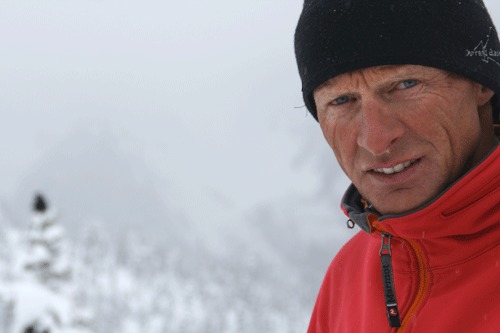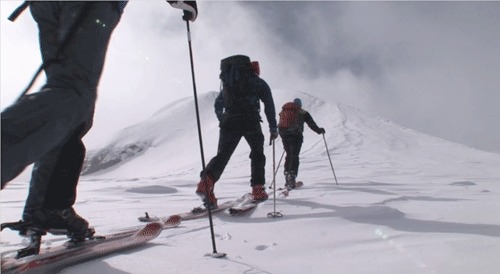Beauty and tragedy of mountain life

Ruedi Beglinger shown in a still photo taken from the documentary “A Life Ascending.”
When the documentary film, “A Life Ascending,” premiered in early June at the Lake Placid Film Forum, it hit home for a number of local audience members.
The documentary by Steven Grynberg tells the story of the Selkirk Mountain Experience, headed by international mountaineering guide Ruedi Beglinger. SME is located in southeastern British Columbia, on a remote stretch of the Selkirk Mountain Range, where snow cover in the winter can be more than 20 feet.
The mountains and glaciers that Beglinger traverses during his ski tours with his clients is strikingly beautiful terrain. That terrain, though, comes with inherent risks for those who visit it. The slopes are steep and avalanches are common. Unfortunately for Beglinger, a well-respected guide, seven members of his 20-person party were killed in such a slide on Jan. 20, 2003.
Immediately, the tragedy cast a spotlight on Beglinger. The media, and some members of the backcountry skiing community, questioned whether Beglinger had made a fatal mistake that could have been prevented. Ultimately, the film does not scrutinize Beglinger’s actions that day. Instead, it explores the sense of heartfelt loss that Beglinger, his wife Nociline, their guides and staff were left with in their chalet more than 6,000 feet high in the mountains.
For those who saw the movie in Lake Placid, the portrait of the SME guide service and Ruedi himself was accurate and dealt with the subject in a delicate but poignant manner. It was also a documentary that hit home because some audience members had skied with Beglinger themselves.

A shot of three climbers from the documentary "A Life Ascending"
One of those who saw the movie here was Dr. Chris Hyson of Lake Placid. Hyson first skied with SME guides in 1980 and has been back several times since, including after the avalanche. In fact, Hyson hired Beglinger this spring to ski the Alps near Chamoix, France.
“I was really impressed with how sensitively the artist was able to approach that subject and deal with what’s really a very sensitive topic and was really quite controversial at the time it happened,” Hyson said.
Hyson said about 10 people from this area have skied with SME and he estimated about a half dozen were at the film. Hyson said there were times on his recent trip that he could sense the effect the avalanche had on Beglinger.
Hyson recalled that while skiing with Beglinger in the Alps this spring that the snow was avalanche prone, and there was a chance that the group may have to take a helicopter out. Hyson said “you could hear the avalanches in the mountains.”
“I could really sense the weight that he was carrying,” Hyson said. “He was obviously greatly relieved when we were able to ski out and get to the road. He actually got on a swing set and started swinging like a kid. I even took a picture of it. Seeing Rudy on a swing set with a big smile. That’s something that one that one doesn’t think of him doing.”
Beglinger, who became a certified mountain guide at the age of 22, grew up in the Swiss Alps and started skiing at the age of 3. In the early 1980s, he settled in British Columbia. In1985, after an 18-month process, he received a permit to build a chalet in the Selkirks and give himself exclusive rights to 76-square acres of glaciers and skiable peaks. Since then, he has gone on to gain a reputation as one of the best mountain guides in the world.
“He’s intense, and I think most people think he’s about the best in the business,” said Lake Placid resident Woods McCahill, who has skied with Beglinger numerous times. “He’s very meticulous about keeping measurements, about the snowpack, keeping track of the snowpack. He has diaries of every year.”
McCahill said he actually knew one of the skiers who died in the avalanche, Vern Lunsford, an aerospace engineer from Littleton, Colo. McCahill also noted that another former Lake Placid resident was on the trip, but wasn’t in the avalanche.
Ultimately, the film is a reminder that although nature provides many people with their fondest memories, it is never something that can be trusted or counted on, which is part of the experience.
“That there are so many factors in a mountain that one has absolutely no control over,” Hyson said. “I think the fact is that if it was (safe), the things to be gained by the mountain experience wouldn’t be there.”
For more information about the film, visit www.alifeascending.com.
- Ruedi Beglinger shown in a still photo taken from the documentary “A Life Ascending.”
- A shot of three climbers from the documentary “A Life Ascending”





